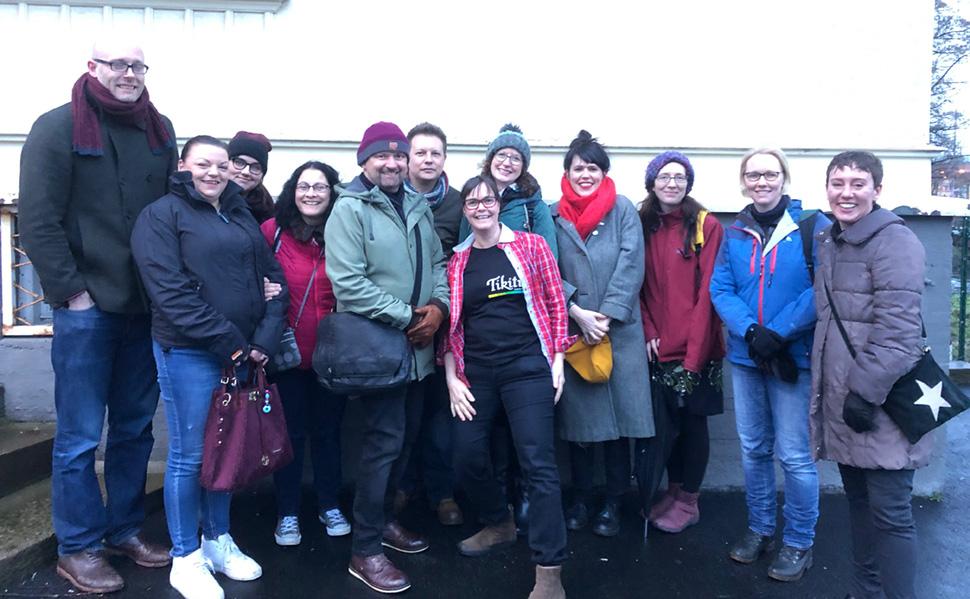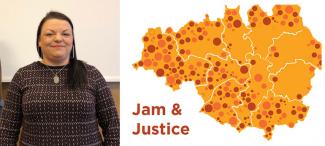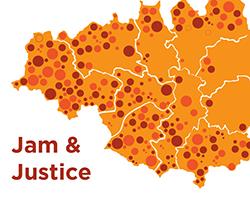
"How can we, the people, govern cities differently?"
Action Research Collective in Greater Manchester/Manchester- Sheffield- Birmingham visited Gothenburg
Jam and Justice is creating spaces for social innovation to support citizens in getting more involved in urban decision-making. They want to facilitate more local expertise, creativity and innovation in urban governance. A delegation of eleven researchers and civil servants, from Greater Manchester and the West Midlands, visited Gothenburg mid-March to exchange experiences from the city and the region.
Jam and Justice is an ”Action Research Collective” (“The ARC”) where at the heart of academic and non-academic researchers come together to look at ways of governing cities differently. Their work together is funded by the UK Economic and Social Research Council, with the Universities of Sheffield, Manchester and Birmingham. Since they first met in 2016, the ARC developed ten action research projects in Greater Manchester (a part of Mistra Urban Futures’ Sheffield-Manchester Platform). Jam and Justice draws to a close this year, and the researchers—academic and non-academic—are keen to share and extend their learning through conversation with other city-regions.
The delegation came with three aims to Sweden: to learn from what is happening in the Gothenburg region, to forge better connections between the UK participants, and to share some of what Jam and Justice has learned about citizen engagement with Gothenburg partners. How do we plan cities together? What does it mean to collaborate directly with citizens? How can citizens be respected, involved and integral to decisions that affect their daily lives?
The Jam & Justice-projects seeks to close the widening gap between citizens and governing authorities and create co-productive urban governance in which citizens are respected, consulted and integral to decisions that affect their daily lives. Is this really possible?
The Action Research Collective co-initiated ten different projects. The projects address big societal challenges like health and Health and Social care, and energy supply, and seek to get citizens involved in decision-making where the chance is often limited.

“It is important for us that persons from all walks of life are involved—e.g. in the ARC. And it matters that we don’t forget that academics and policy-makers are citizens too”, says Iona Hine, Jam and Justice’s Impact Officer. Iona’s role is to track the consequences of Jam and Justice’s research, looking for and recording evidence of change in and as a result of the different ARC projects.
Focus on young persons and teenagers
Do youth (marginalized) youngsters and young teenagers get the chance to affect their own future and the society they live in? The Action Research Collective are curios in getting citizens that usually do not get their voices heard, nor get the opportunity to be consulted. One key reason for starting this work in Greater Manchester in 2016 was the process of UK city-regional devolution. In 2017, Greater Manchester elected its first Mayor. New powers transferred from central government to the city region. This coincided with growing international recognition of the need for meaningful citizen participation in decision-making. Could devolution provide the opportunity for more meaningful participation? How might universities contribute to meaningful change?
“One challenge is the passing of knowledge between generations and sectors. What is knowledge and how do we use knowledge for society in the very best way? How do we get knowledge implemented?” asks Beth Perry, Professorial Fellow at the Urban Institute at the University of Sheffield, co-lead of the Jam & Justice project and Local Interaction Platform lead for Sheffield-Manchester).
The Jam and Justice researchers embraced “action research” as a method. This means learning-by-doing and not being afraid to influence the outcome by getting actively involved in the process.
On the agenda during the delegation’s two-day visit in Gothenburg were a range of conversations about how to involve citizens in governing a city region, with a particular emphasis on imagining each city’s future. The delegation from the UK learned about co-creation and co-production initiated by Mistra Urban Futures in the city region of Gothenburg (the municipality) and shared examples from their work in Greater Manchester and the West Midlands. They met with representatives from Gothenburg City and from Gothenburg Region, and visited a community organization in Gamlestan.
Examples shared by the UK delegates
ARC member Andrew Burridge spoke about his involvement with The Care at Home Inquiry: “Providing good home care is a real challenge. The Care at Home project produced 12 recommendations of what could be done to enable people to live a good life at home (not in hospital) for as long as they choose. The recommendations were revealed at a launch-event, where a wider group of stakeholders helped to think about who could take the recommendations forward and how. The Greater Manchester Health & Social Care Partnership welcomed this intervention: Findings in Jam & Justice’s Care at Home report provided independent support for new policy directions that the Partnership were thinking about.”
More of people's procurement
Greater Manchester policy officer Anne Lythgoe shared her experience as a participant in the People’s Procurement ARC project: “Part of my role is to represent non-government organisations. In the UK, the rules that govern procurement decisions tended to focus on the idea that the cheapest is the best. This project enabled us to think about how we could include extra ‘social value’ in the purchasing process. E.g. How can we make decisions that include the additional benefit for the local community, if those providing goods and services reinvest in the area—through jobs or support for community organisations? We’re now changing policy at the city-regional level, informed by the People’s Procurement project report.”
Building on people's stength
ARC member Adrian Ball spoke about how becoming part of the Action Research Collective had influence his policy and practice as chief executive of the community organization Manchester Settlement. “We want the people we help to get involved in helping others, creating cycles of community change. So we consult, and co-design packages of support, build on people’s strengths. We get them active in their own lives and then in the lives of other people in the community. Bits of that approach were always there, but Jam and Justice has reinforced my ability to explain that to others and my understanding of the “cycle” we want to achieve That’s very much a sustainable outcome from the Jam and Justice programme.”
ARC member Sarah Whitehead explained how a project with community researchers had used photovoice (videos) methods to analyse do-it-yourself community work in deprived places, making an exhibition called Everyday Politics. She shared some of the common reactions to this work: “Many didn’t know people could do things off their own agenda, just through care for local people and environment. I shared the exhibition with a Youth council, who found it inspiring to see that people can create change. I’ve taken Everyday Politics to other parts of Europe, supported by the Open Society Foundation and German Marshalls fund. Seeing it, people realized they don’t need permissions, or to take part in unfamiliar systems and processes, to create change. We can succeed in changing the narrative around what people in poverty are about, show that they’re doing all these things for free, every day.”
Why is the main project called “Jam & Justice”?
The “jam” represents a way of closing the gap between urban decision-makers and the many civil society initiatives. We bring together diverse stakeholders to address shared problems. “Justice” is about reconnecting with those who have been disenfranchised and excluded from the search for solutions.
Link to the Gothenburg region GR:s article. Jam & Justice report from the visit
For more information visit: jamandjustice-rjc.org
For more information of ESRC Urban Transformations programme: urbantransformations.ox.ac.uk
Professor Beth Perry, LIP Director i Sheffield-Manchester is Principal Investigator in Jam & Justice-project.
Photo: Annika Källvik







